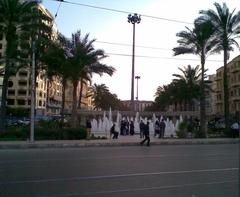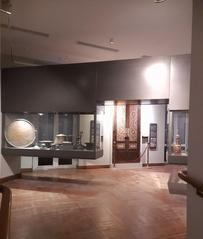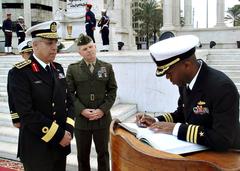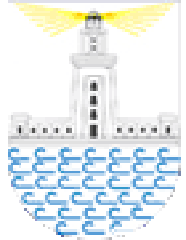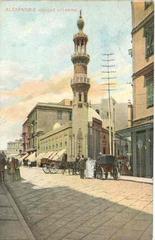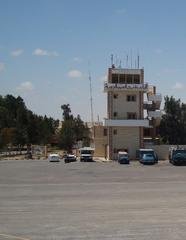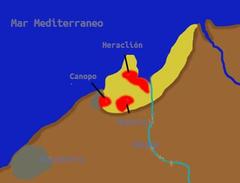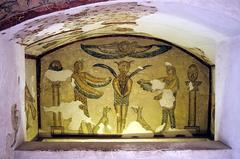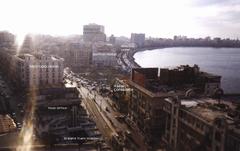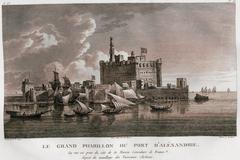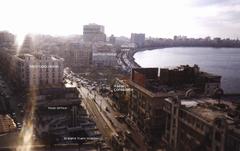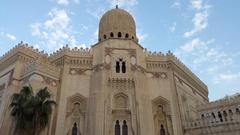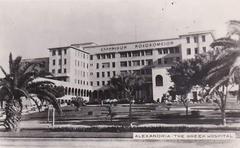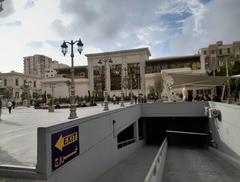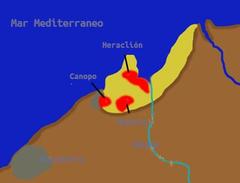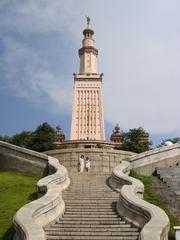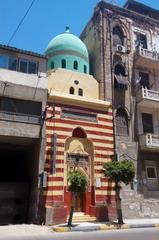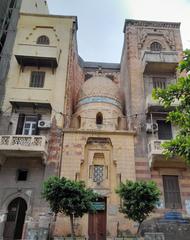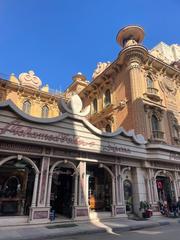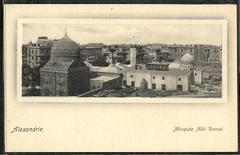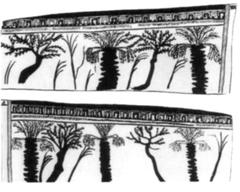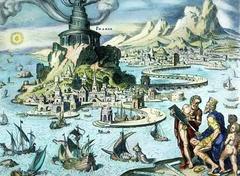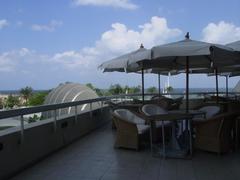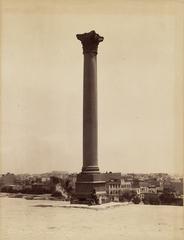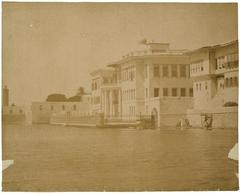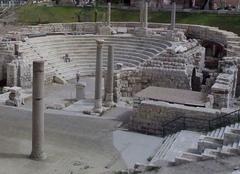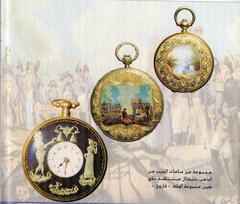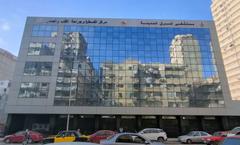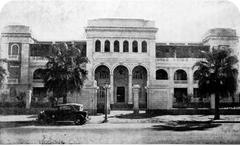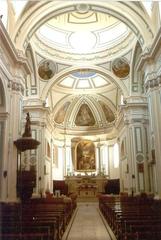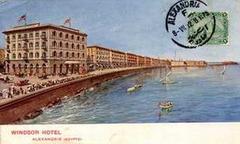Egyptian Naval College Alexandria: Visiting Hours, Tickets, and Travel Guide
Date: 14/06/2025
Introduction: A Pillar of Egypt’s Maritime Heritage
Nestled in the historic port city of Alexandria, the Egyptian Naval College is a prestigious military academy that plays a pivotal role in Egypt’s maritime defense. Established in 1946, the college was created to meet the need for a modern naval force capable of protecting Egypt’s extensive coastlines along the Mediterranean and the Red Sea. Over the decades, the institution has grown into a regional center of naval education, blending rigorous military training with a legacy that echoes Alexandria’s longstanding maritime significance.
Due to its operational military status, the college is not accessible to the general public. However, it remains a symbol of national pride and naval excellence. This guide provides a comprehensive overview of the Egyptian Naval College’s history, institutional significance, and essential information regarding visits and nearby attractions in Alexandria. For those passionate about Egypt’s naval past, military education, or the city’s cultural landscape, understanding the role and protocols surrounding the college is invaluable.
For official details and authoritative updates, refer to the Egyptian Ministry of Defense Official Website and the Egyptian Naval College Official Site. For further reading on Egypt’s navy and Alexandria’s maritime relevance, see Wikipedia - Egyptian Navy and Britannica - Alexandria.
Table of Contents
- Historical Background
- Institutional Significance
- Visiting the Egyptian Naval College
- Frequently Asked Questions (FAQ)
- Conclusion
- Visual Media and Resources
- Sources
Historical Background
Foundation and Early Development
Founded in 1946, the Egyptian Naval College was established to modernize Egypt’s naval forces and secure the nation’s maritime borders. Alexandria was selected as its home due to its strategic location and rich naval legacy, with roots tracing back to the Ptolemaic and Roman eras. Initially, the college’s curriculum reflected British naval traditions, a remnant of Egypt’s colonial past, but soon evolved to incorporate Egyptian maritime heritage and the unique needs of the Egyptian Navy.
Growth and Modernization
The college expanded rapidly following the 1952 revolution, benefiting from increased national investment in defense. By modernizing facilities and introducing advanced training—including navigation, engineering, and warfare tactics—the college became a regional leader in naval education. In the 1970s and 1980s, it began welcoming cadets from allied Arab and African nations and updated its curriculum to address technological advancements, such as missile boats and electronic warfare (Egyptian Navy Overview).
Role in National Defense
Graduates of the Egyptian Naval College have played vital roles in major military operations, including the Suez Crisis, the Six-Day War, and the Yom Kippur War (Egyptian Military History). The college also supports Egypt’s broader security by training officers from partner countries and participating in joint naval exercises, thereby enhancing Egypt’s stature as a maritime power and regional security partner.
Institutional Significance
Academic and Training Programs
The college’s four-year program combines academic study with rigorous military training. Cadets are educated in navigation, marine engineering, tactics, communications, and leadership, with a strong emphasis on practical seamanship using simulators, training vessels, and laboratories. English language proficiency is encouraged to facilitate international cooperation (Egyptian Naval College Official Site).
Societal Contributions
Beyond military service, the college contributes to Egypt’s maritime sector, supplying skilled professionals to the merchant marine, port authorities, and related industries. Its presence in Alexandria supports the local economy and community, while graduates often participate in community service and national projects.
International Partnerships
The Egyptian Naval College maintains active partnerships with naval academies worldwide, hosting exchange programs, international exercises, and conferences (Naval Education Partnerships). This global engagement ensures that Egyptian naval officers are trained to international standards and fosters regional stability.
Strategic Location in Alexandria
Situated near the Suez Canal and adjacent to vital naval and maritime facilities, the college offers cadets hands-on experience in real maritime environments (Alexandria’s Maritime Importance). Its proximity to shipyards and the Alexandria Maritime Academy fosters a dynamic learning atmosphere.
Cultural Legacy and Notable Alumni
The college is integral to Alexandria’s tradition as a center of maritime learning. Its ceremonial events are significant cultural occasions. Alumni have achieved distinction in the Egyptian Navy and beyond, including pioneering roles in peacekeeping, technology development, and the integration of women into naval service (Women in the Egyptian Military).
Challenges and Future Directions
Ongoing challenges include adapting to new technologies, evolving security threats, and attracting top talent. The college invests in cyber defense, advanced training, and research to remain at the forefront of naval education.
Visiting the Egyptian Naval College
Access Protocols and Security
General Public Access:
The Egyptian Naval College is a secure military facility. Access is limited to:
- Official delegations and military personnel
- Academic or scientific groups with prior approval
- Participants in sanctioned events or conferences
- Family members of cadets during open days
Security Protocols:
- Identity verification and security screening are mandatory.
- Photography, use of drones, and unauthorized documentation are strictly prohibited.
- Visitors must be escorted at all times and adhere to a conservative dress code.
Legal Restrictions:
Unauthorized entry is a criminal offense under Egyptian law (Travel.State.Gov). Special permits must be obtained through the Ministry of Defense or diplomatic channels.
Tickets and Tours
There are no regular public tours or ticket sales. All visits require advance coordination and official approval. Group and educational tours may be possible for those with formal invitations. For information on special events or potential access, contact:
- Egyptian Ministry of Defense
- Alexandria Governorate Official Tourism
- Specialized travel agencies for military or academic tours
Travel Tips and Accessibility
- Location: The college is located in Abu Qir, northeast of Alexandria’s city center, easily accessible via taxi or private transport.
- Transport: The nearest airport is Borg El Arab International; taxis are recommended for reaching the site.
- Accessibility: Facilities for visitors with disabilities are limited; advance communication is advised.
- Best Time to Visit: Plan for cooler months (November–March) if attending events in Alexandria.
- Language: Arabic is primary; English is often used in official contexts.
Nearby Attractions
Although the Naval College is closed to the public, Alexandria offers a wealth of accessible sites:
- Bibliotheca Alexandrina: World-renowned library and cultural center
- Citadel of Qaitbay: 15th-century fortress on the Mediterranean
- Roman Amphitheatre: Ancient historical landmark
- Montaza Palace and Gardens: Royal gardens and seaside views
- Alexandria National Museum: Rich collection of Egyptian artifacts
Frequently Asked Questions (FAQ)
Q: Can tourists visit the Egyptian Naval College?
A: No, access is restricted to authorized personnel and official guests only.
Q: Are there visiting hours or tickets?
A: There are no public visiting hours or ticketing options.
Q: How do I arrange an official visit?
A: Submit a formal request through the Ministry of Defense or via recognized travel agencies.
Q: Is photography allowed?
A: Photography and use of electronic devices are prohibited without explicit permission.
Q: What other sites can I visit in Alexandria?
A: The Bibliotheca Alexandrina, Citadel of Qaitbay, and Alexandria National Museum are excellent alternatives.
Conclusion
The Egyptian Naval College is a prestigious institution at the heart of Egypt’s naval heritage, but its restricted access reflects its critical military role. Prospective visitors should respect all legal and security protocols, arranging any potential access well in advance through official channels. Alexandria’s plethora of accessible historical and cultural sites ensures that all travelers can experience the city’s maritime legacy.
For the latest updates and personalized travel advice, download the Audiala app, consult our related articles, and follow us on social media for tips on exploring Egypt’s rich history safely and respectfully.
Visual Media and Resources
- Interactive Map: Alexandria Maritime Sites
For further details and official resources, visit:
Sources
- Egyptian Naval College Alexandria: History, Visiting Information, and Maritime Legacy, 2025 (Egyptian Naval College Official Site)
- Egyptian Navy Overview, 2025 (Wikipedia - Egyptian Navy)
- Egyptian Military History, 2025 (Wikipedia - Military history of Egypt)
- Naval Education Partnerships, 2025 (NATO - Naval Education Partnerships)
- Alexandria’s Maritime Importance, 2025 (Britannica - Alexandria)
- Women in the Egyptian Military, 2021 (Al-Monitor)
- Visiting the Egyptian Naval College in Alexandria: History, Tours, and Visitor Information, 2025 (Alexandria Governorate Official Tourism)
- Visiting the Egyptian Naval College: Legal Restrictions, Visiting Hours, and Nearby Alexandria Attractions, 2025 (Travel.State.Gov Egypt Travel Advisory)
- Visa Egypt, 2025 (Visa Egypt)
- The Egyptian Traveler, 2025 (The Egyptian Traveler)

